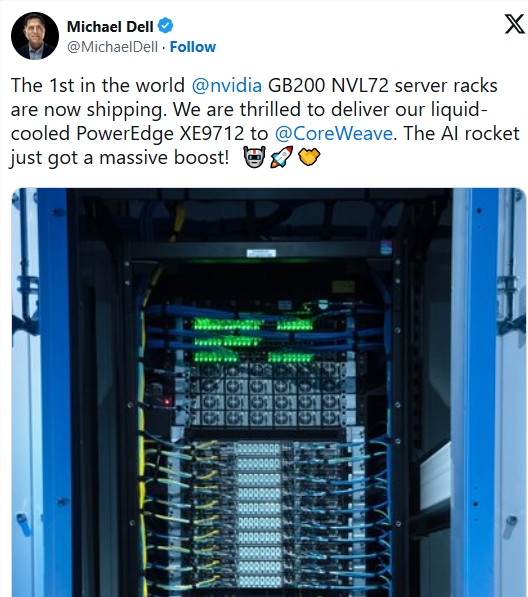The editor of Downcodes learned that Dell Technologies has made a major breakthrough in the field of AI hardware and became the first company in the world to launch a new generation of dedicated AI supercomputing systems, marking a new era in AI infrastructure construction. This breakthrough not only represents technological leadership, but also heralds huge potential for the future development of the AI industry. Dell's cooperation with NVIDIA applies liquid cooling technology to the PowerEdge XE9712 system, which greatly improves AI computing performance and provides strong impetus for the rapid development of AI applications.
Dell Technologies has made a major breakthrough in the field of AI hardware, becoming the first technology company in the world to launch a new generation of dedicated AI supercomputing systems. This breakthrough means that AI infrastructure construction has entered a new era.
Dell founder and CEO Michael Dell announced through social media platform X that the company has begun delivering the first batch of liquid-cooled PowerEdge XE9712 systems to AI computing service provider CoreWeave. The AI rocket has gained a lot of thrust! Michael Dell emphasized this important achievement in the announcement.

This new system, jointly developed by Dell and NVIDIA, uses breakthrough liquid cooling technology and completely subverts the design concept of traditional computers. This difference is like the difference between an ordinary car engine and an F1 racing engine - although they are both engines, the performance of the latter far exceeds that of the former.
The new system is named GB200NVL72 and integrates 72 GPUs and 36 CPUs. All processors work together to form a powerful computing unit. This design enables the system to improve performance by 30 times compared with the previous generation when processing complex AI tasks such as chat bots and image generation.
The recipient of the first batch of systems, CoreWeave, is a company focused on providing high-performance computing services to AI companies. The company maintains a close partnership with NVIDIA, the designer of the system's core technology.
In the context of global technology companies competing to deploy AI computing power, this breakthrough is of great significance. Industry experts predict that demand for similar systems will continue to rise, with global shipments expected to reach 20,000-25,000 units in 2025. This not only reflects the market's urgent demand for high-performance AI computing systems, but also indicates that AI infrastructure is about to enter a period of rapid development.
Dell's move will undoubtedly promote the rapid development of the AI industry, and its new generation AI supercomputing system will also become a key infrastructure for future AI development. The editor of Downcodes will continue to pay attention to the technological development and market trends in the field of AI and bring more exciting reports to readers.